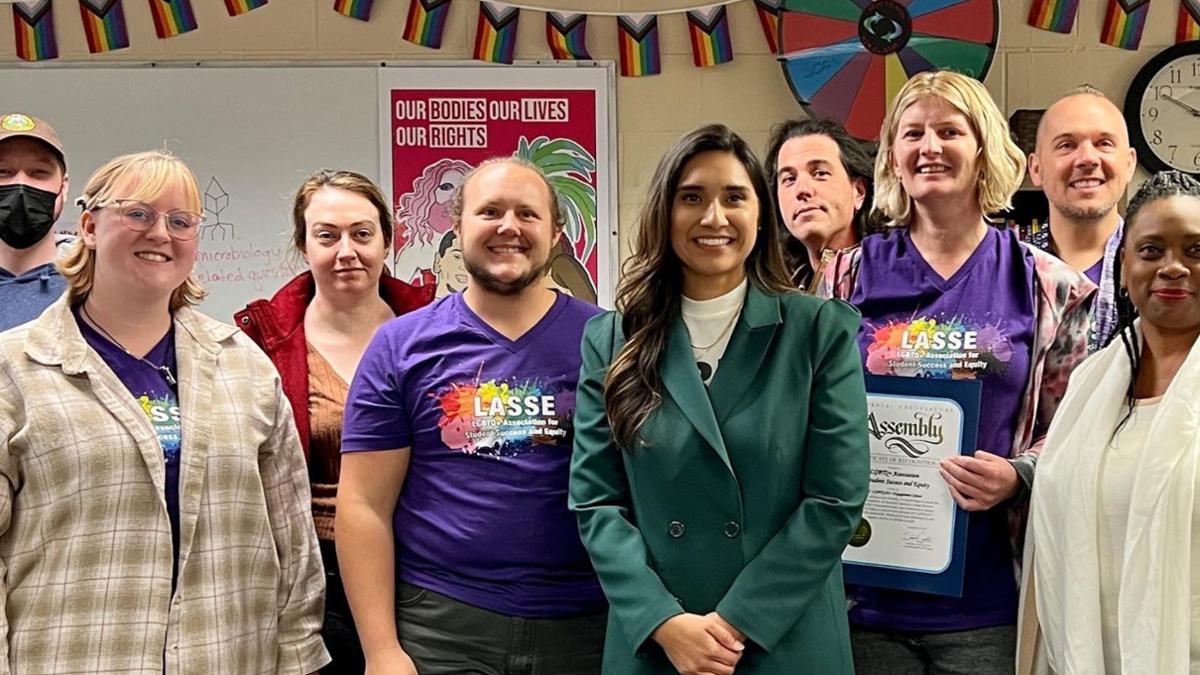Riverside City College's Rainbow Engagement Center: A Growing Hub for Inclusion and Support

Since its opening in Fall 2021, Riverside City College’s Rainbow Engagement Center (REC) has grown into a vital resource, providing LGBTQIA2+ students with a dedicated space to study, connect, and find support. What began as a modest initiative with just two hours of availability per week has flourished into a thriving center that serves hundreds of students each semester. This growth is a testament to the center's importance and the dedication of volunteers who keep it running.
The REC was established to meet the unique needs of LGBTQIA2+ students, many of whom face social, economic, and academic challenges that impact their educational success. An unique opportunity that was made possible through the Ally association.
The center has experienced rapid growth across its first few years:
- Fall 2021 (2 hours/week): 53 visits by 26 students
- Spring 2022 (24.5 hours/week): 82 visits by 43 students
- Fall 2022 (22.5 hours/week): 299 visits by 103 students
- Spring 2023 (33 hours/week): 847 visits by 215 students
- Fall 2023 (25.5 hours/week): 1,385 visits by 300 students
- Spring 2024: 632 visits by 376 students (Note: Data affected by computer issues during renovations)
In just three years, the REC has become a beacon for students seeking academic support, counseling, community resources, mentorship, snacks, and a welcoming environment to connect with others.
“The Rainbow Engagement Center is my home on campus, and the community there feels like family. It provides lots of great resources for all students, and I look forward to all the time I get to spend there” stated RCC student Lily Vega.
Yet, this growth has been achieved entirely through the hard work and dedication of faculty, classified professionals, and administrators volunteering their time to keep the center open.
“Volunteers have been the heart of the Rainbow Engagement Center,” said Al Weyant-Forbes, EOPS Specialist and Co-Chair of the LGBTQIA+ Association for Student Success and Equity. “They have adjusted their schedules, given up lunch hours, and created innovative ways to conduct office hours from the center. This commitment has allowed us to grow, but it is not sustainable without additional support.”
Sustaining the REC’s Success
While student engagement continues to rise, the center currently operates just 19.5 hours per week—its lowest since the first full semester of operation—due to staffing challenges. With only one person on shift at a time, staff must frequently find last-minute coverage, leading to unpredictable closures. This inconsistent availability makes it difficult to meet the demand from students who rely on the REC.
Despite these challenges, the REC continues to perform and grow. From August 26 to October 16, it served 553 visitors—a testament to the growing need for dedicated spaces like this. Projections suggest that, if open full-time, the REC could serve over 1,000 visits per semester.
More Than a Space—A Lifeline for Students
The importance of the REC extends beyond academic support. As a Hispanic-Serving Institution (HSI), RCC recognizes that 78% of students identifying as non-binary are also students of color, with 58% identifying as Latinx. Supporting LGBTQIA2+ students directly aligns with RCC’s mission to advance equity and serve historically underrepresented communities.
External data highlights the critical need for safe spaces and resources:
- Report a lower sense of safety and belonging on campus, and perceive their campus environments as more negative overall (Greathouse et al., 2018)
- Trans students experience homelessness at nearly 2.5 times the rate of cisgender students. (James et. Al, 2016)
- LGBTQIA2+ students are nearly twice as likely to consider leaving college compared to their peers (Greathouse et al., 2018).
- 32% of LGBTQ people have a household income below $20,000, and 55% have a household income under $40,000. (Mental Health America, 2019)
“Creating inclusive spaces is more than just providing a room—it’s about building community and fostering a sense of belonging,” said Weyant-Forbes. “The REC has become a lifeline for many students, offering not just resources but also connection, which is vital for student retention and success.”
Looking Ahead
To maintain momentum and continue serving students effectively, RCC is calling for institutional support to stabilize the REC’s operations. The volunteers who have sustained the center since its inception are reaching the limits of what they can offer. Without additional staffing or financial backing, the REC’s growth and ability to meet student needs may be compromised.
As RCC celebrates the success of the Rainbow Engagement Center, it also acknowledges the importance of community involvement to ensure the center’s future.
“We’ve come so far thanks to our volunteers,” said Weyant-Forbes. “But for the REC to reach its full potential, we need broader institutional and community support.”
The Rainbow Engagement Center stands as a shining example of what can be achieved through grassroots efforts, and with the right support, it will continue to thrive as a cornerstone of inclusivity on RCC’s campus.